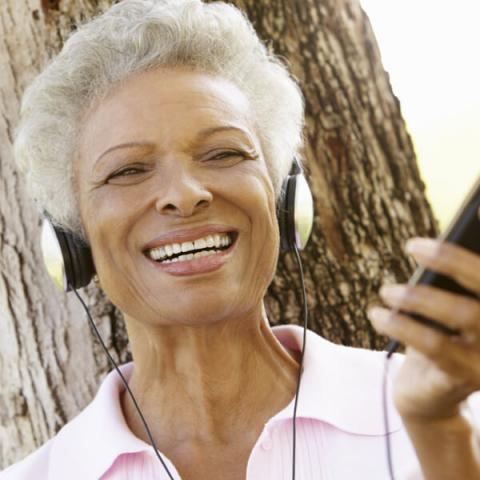
When was the last time you rocked out in your car on the way home from work, cranking up the volume when your favorite song came on? For most of us, it was probably yesterday. It’s tempting to turn it up. However, for our hearing health, it’s important that we say no to our inner rock legend and keep the sound levels reasonable.
Between televisions, computers, smartphones, and music listening devices, most of us are casually surrounded by noisy modern technologies 24/7. In addition to constant exposure, we are often guilty of listening to our technologies at far too loud of a volume.
According to the CDC, the maximum volume level for personal listening devices, a very loud radio, stereo, or television, is generally between 105 to 110 decibels. For reference, the CDC notes that noises above 85 decibels may begin to damage your hearing after a period of time, while noises above 120 decibels can cause immediate harm to your ears. At 105 to 110 decibels, hearing loss is possible in less than 5 minutes.
If you max out the volume on your device, you can experience hearing loss in less than 5 minutes!
In 2015, the World Health Organization reported that nearly 50 percent of teens and young adults ages 12 to 35 were exposed to unsafe levels of noise from their personal music players and smartphones. Other studies have found a significant increase in young people with hearing loss compared to previous decades.
At this point, several years have passed since those studies were performed and personal listening devices and smartphones have only grown in popularity. The technologies mentioned are common among all age groups, and as we plug in and boot up our devices, we need to be aware of how they affect our health.
Why does hearing loss occur due to loud sounds?
Exposure to loud noises overworks the hair cells in the inner ear. If you’ve ever been exposed to loud noise and then heard ringing in your ears or had difficulty hearing afterward, the hair cells in your ear have been overworked. Sometimes, the hair cells recover and your hearing returns to normal, but that’s not always the case.
When exposed to excessively loud sounds, the hair cells, at some point, will be damaged or destroyed. It’s even possible for damage to continue occurring even after the noise has stopped. The end result is hearing loss.
How can I stay safe when using technological devices?
The easiest way to prevent hearing loss from your smartphone or listening device is to be mindful of the volume. You don’t need to listen to music, television, or podcasts at a loud level to enjoy them.
How many times have you heard someone else’s music even though they were wearing headphones or earbuds? That means they were listening to the device far too loudly. Don’t follow their example.
If background noise is interfering with your ability to hear, move to a quieter area or turn off the device until you can appreciate your entertainment in peace. Do not compete with a noisy environment by sliding the volume knob up!
Also, take regular breaks from noise exposure to give your ears a rest and allow them time to recover.
If you are in a public place, like a music venue, and the music is blaring, use a form of protection, like earplugs, to safeguard your hearing. Earplugs are readily available, and you can keep them stashed in your vehicle, your purse, or even in your pocket so you can pop them in if you need them.
What do I do if I’ve already been exposed to loud noises?
Familiarize yourself with the first signs of hearing loss. If you are experiencing any of the below symptoms, you may have damaged your ears.
- Difficulty hearing in noisy areas. You may have a hard time understanding your dining companion in a busy restaurant or shopping area.
- Difficulty hearing high-pitched sounds. You may miss the ring of your telephone or leave a guest waiting outside because you didn’t hear the doorbell. You might be late to work because you slept through your alarm clock, and voices in higher ranges may become more difficult to comprehend.
- Phone conversations may be more bothersome. You may need to ask the person on the other end of the line to repeat themselves often.
- Sounds may seem muffled to you, or you may experience ringing in your ears.
- You may begin experiencing hypersensitivity to certain sounds. The sounds may even become painful for you to hear. This condition is called Hyperacusis, and it may be a sign of injury to your ears.
It is important to know that the above signs mean you may have suffered damage due to loud noise, a condition called noise-induced hearing loss.
However, you don’t have to wait for signs of damage to take action. Your doctor can examine your ears and test your ability to hear at any time.
You can also use our Online Hearing Check to gauge your hearing ability. Be aware, it’s not a substitute for a doctor’s visit. For an official diagnosis, you will need to see a doctor.
If an exam or test shows that you have suffered damage, a hearing aid may be able to help you to hear again. If you have not suffered any damage yet, be careful to keep the volume lower moving forward and use hearing protection when in loud areas.
If you have questions about finding an affordable hearing aid that works for you, don’t hesitate to contact our Affordable Advanced Hearing team at 1 (800) 804-0434.
